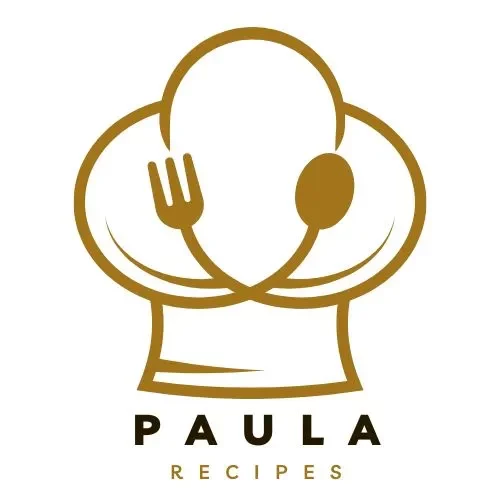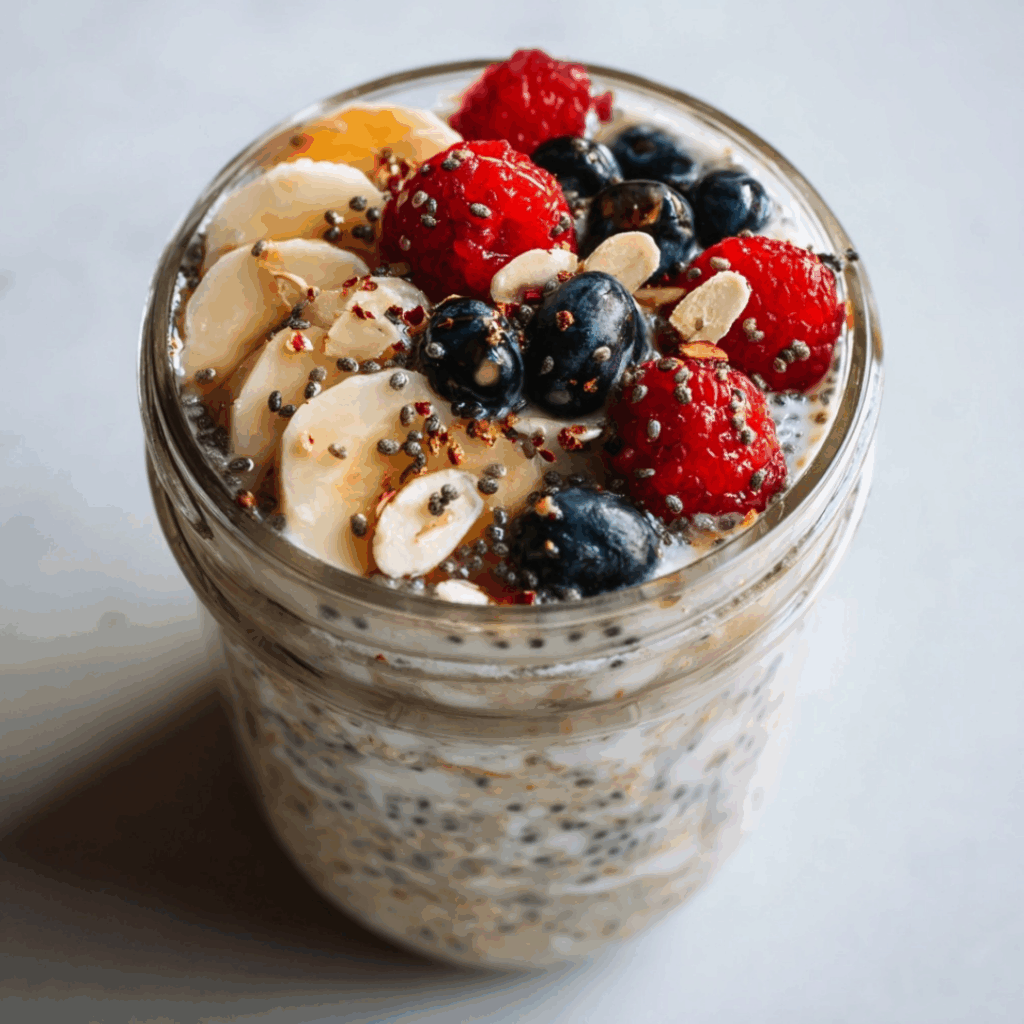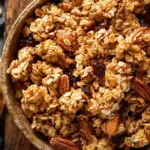If you’ve ever wondered what makes overnight oats such a smart choice, you’re not alone. In this article, we’ll break down the essential overnight oats nutrition facts, including calories, macros, vitamins, and variations like mush and protein-packed options. You’ll also learn how they compare to other breakfasts, and whether it’s okay to eat them every day. Whether you’re trying to lose weight, build muscle, or simply stay full till lunch, this guide gives you the full scoop on what’s in every spoonful of this creamy, no-cook breakfast favorite.
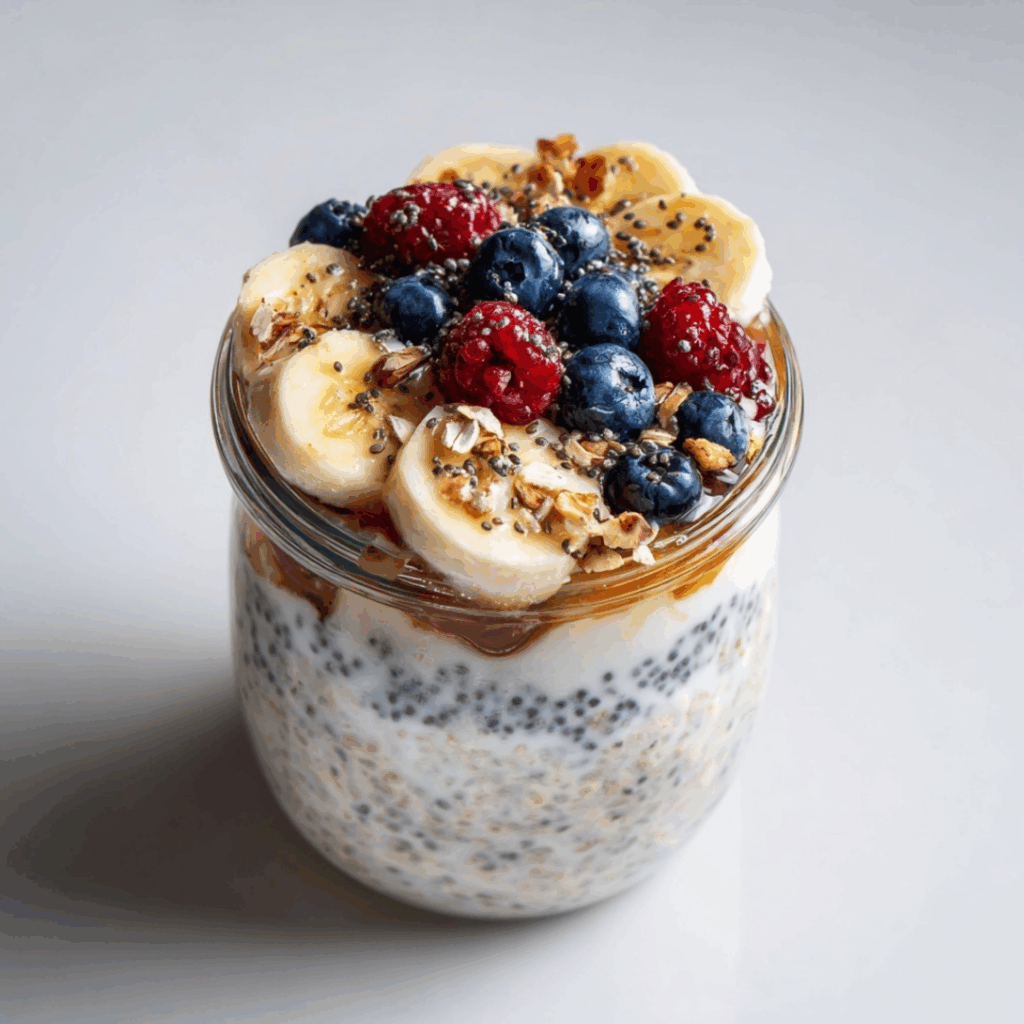
Why I Fell in Love with Overnight Oats Nutrition Facts
Growing up, mornings in our house were always busy. With school lunches to pack and the clock ticking, breakfast had to be fast—but my mom never compromised on nutrition. That’s where oats came in. But it wasn’t until years later, in my own kitchen, that I truly fell in love with overnight oats. The first time I made them, I was skeptical. Could something so simple really be that satisfying?
Spoiler: it was. And when I started digging into overnight oats nutrition facts, I realized this wasn’t just a quick breakfast—it was a powerful way to fuel my day. Whether I was prepping for a long writing session or planning a hike, they kept me energized and full. One of my favorite variations, a creamy peanut butter banana version, was a hit with friends, especially when paired with a topping of fresh berries and chia seeds.
The beauty of this breakfast is in its simplicity and strength. Nutrition facts for overnight oats show that they’re rich in fiber, protein, and healthy fats—making them an ideal breakfast choice whether you’re watching your weight, managing blood sugar, or just want to eat well. It’s no wonder they’ve become a staple in Paula’s Kitchen—and I can’t wait to share the full breakdown with you.
Just like our protein baked oatmeal or the fun indulgence of a banana split dump cake, this recipe proves that healthy and delicious can absolutely go hand in hand.
What Makes Overnight Oats So Nutritious?
Understanding Overnight Oats Nutrition Facts
At its core, overnight oats nutrition facts start with rolled oats, which are a powerhouse of complex carbs, fiber, and essential micronutrients. In just half a cup of dry oats (before soaking), you’ll find about 150–160 calories, 5 grams of protein, 27 grams of carbs, and 4 grams of fiber. That’s before adding any milk, yogurt, fruits, or seeds.
The magic happens overnight—literally. Soaking the oats in liquid breaks down starches and reduces phytic acid, making the nutrients more bioavailable. Add Greek yogurt or almond milk, and your oats suddenly get a protein and calcium boost. Stir in chia or flax seeds, and you’re loading up on omega-3s and antioxidants.
This simple cold meal becomes a nutrient-dense start to your day without any cooking or fancy prep. In fact, many people find overnight oats easier to digest than traditional cooked versions. The customizable nature of the meal also means you can tailor the oats overnight nutrition facts to your exact dietary needs.
Comparing Mush Overnight Oats Nutrition Facts
“Mush” has taken the overnight oat trend mainstream with pre-packaged versions available in stores. But how do Mush overnight oats nutrition facts compare to homemade?
A typical container of Mush overnight oats contains:
- Calories: 190–210
- Protein: 5–7g
- Carbs: 25–30g
- Fat: 7–8g
- Sugar: 5–8g (mostly natural from fruit)
That’s pretty solid nutrition-wise, especially if you’re on the go. However, keep in mind the portion sizes are often smaller than homemade. And store-bought options may include preservatives or added sugars, depending on the flavor.
Making your own gives you complete control—not just over flavor, but over ingredients and serving size. You can create nutrient-packed variations just like our starbucks-inspired egg white spinach wraps or hearty options like our hash browns breakfast stacks for an energizing start.
Customizing Oats Overnight Nutrition Facts to Match Your Health Goals
High-Protein Variations and What They Deliver
When you’re fine-tuning your breakfast for strength, recovery, or satiety, oats overnight nutrition facts can shift dramatically based on what you mix in. Start with your base: half a cup of oats and half a cup of unsweetened almond milk or low-fat dairy milk. From there, add:
- 1/2 cup Greek yogurt (10g protein)
- 1 tablespoon chia seeds (2g protein, 5g fiber)
- 1 scoop protein powder (20g protein)
This powerhouse combo totals nearly 30–35 grams of protein, ideal for muscle maintenance and controlling blood sugar. With these additions, your bowl stays under 400 calories and delivers complex carbs, healthy fats, and fiber—all without added sugar. This makes overnight oats a protein-heavy option that’s as satisfying as it is smart.
Compare that to a sugar-laden muffin or even many store-bought granola bars, and it’s clear who wins the morning. This kind of high-protein breakfast rivals the flavor and functionality of our potato egg and cheese breakfast tacos and is just as quick to prepare.
Low-Calorie and Low-Sugar Modifications
Watching your calorie intake? The good news is nutrition facts overnight oats can easily fit a lighter plan with the right tweaks. Start with unsweetened almond or cashew milk, which keeps the base under 100 calories. Then:
- Use berries (low in sugar) instead of bananas
- Skip nut butters, or use powdered peanut butter
- Add cinnamon or vanilla for natural flavor
- Limit added sweeteners like maple syrup to 1 tsp or skip altogether
This version clocks in around 250–300 calories and keeps sugar under 6 grams. You’re still getting 5g fiber and around 10g protein—enough to keep you full until lunch. It’s perfect for those busy mornings when you need fuel but don’t want to feel heavy.
Similar to our loaded breakfast sandwich but much lighter, this adaptation of overnight oats gives you all the energy, none of the crash.
The Micronutrient Boost in Nutrition Facts for Overnight Oats
Fiber, Vitamins, and Minerals That Fuel Your Body
One of the most overlooked strengths in nutrition facts for overnight oats is the micronutrient profile. A typical serving of overnight oats delivers:
- Iron: 10–15% of daily needs
- Magnesium: 20% of daily needs
- Zinc: 10%
- B Vitamins (especially B1 and B5)
- Calcium and Vitamin D (if using fortified milk)
- Potassium (from bananas or berries)
That’s a whole lot of value packed into a 5-minute prep meal. Plus, with just half a cup of oats, you get around 4 grams of dietary fiber, and that number can jump to 8–10g when you add flaxseeds, chia, or fruit. This supports healthy digestion, reduces cholesterol, and promotes stable blood sugar.
It’s also why overnight oats are perfect for heart health and long-lasting energy. They share the same functional advantage as our creamy avocado grilled cheese—simple ingredients, massive nutrient payoff.
Digestive Benefits and Long-Lasting Satiety
The fiber in oats—especially the soluble kind called beta-glucan—forms a gel-like substance in your digestive tract. This slows down digestion, helping you stay full longer. It also feeds your gut’s healthy bacteria, improving gut health overall.
That’s why so many people find themselves craving fewer snacks after a hearty jar of overnight oats. Compared to sugary cereal or toast, nutrition facts overnight oats show how much more balanced this breakfast is. You’re not just eating to satisfy hunger—you’re eating to nourish your body from the inside out.
For those managing cholesterol or blood sugar, these oats perform just as well as heart-healthy dishes like our raspberry lemon heaven cupcakes—yes, even dessert can be made smarter.
Is It Okay to Eat Overnight Oats Every Day? The Balanced Truth
Daily Breakfast or Nutritional Overload?
You’ve read the overnight oats nutrition facts—but should you eat them every day? The answer: absolutely, if you build them smartly. Unlike repetitive breakfast foods that lack variety, overnight oats offer endless customization. By rotating your ingredients—different fruits, nuts, seeds, and proteins—you avoid dietary monotony while keeping the base nutrient-dense.
There’s no downside to having overnight oats frequently unless you ignore balance. Be mindful of portion sizes, sweeteners, and fat-rich toppings. Consistently overloading with nut butters, chocolate chips, or sweetened yogurts can turn a healthy bowl into a calorie bomb. But when portioned right, they fit into almost any eating plan—weight loss, heart-healthy, diabetic-friendly, and even high-protein regimens.
Just like our easy pancake poppers or blueberry cream cheese egg rolls, smart swaps and mindful toppings can turn a fun meal into a healthy habit.
Balancing Carbs, Fats, and Protein for Maximum Benefits
Now, let’s talk macros. Overnight oats on their own are higher in carbs, but they become incredibly well-rounded with the right mix-ins:
- Protein: Greek yogurt, protein powder, cottage cheese, chia seeds
- Healthy fats: Almond butter, flaxseeds, walnuts, hemp seeds
- Low-GI carbs: Oats, berries, apples
This macronutrient balance keeps blood sugar steady and energy sustained. Think of it like building a plate: carbs for fuel, protein for strength, and fat for satiety.
That balance is why nutrition facts for overnight oats earn their praise. They’re not just convenient—they’re powerful. They align with smart meals like our buffalo chicken egg rolls and cheddar and bacon turkey melt where macros matter and flavor never takes a back seat.
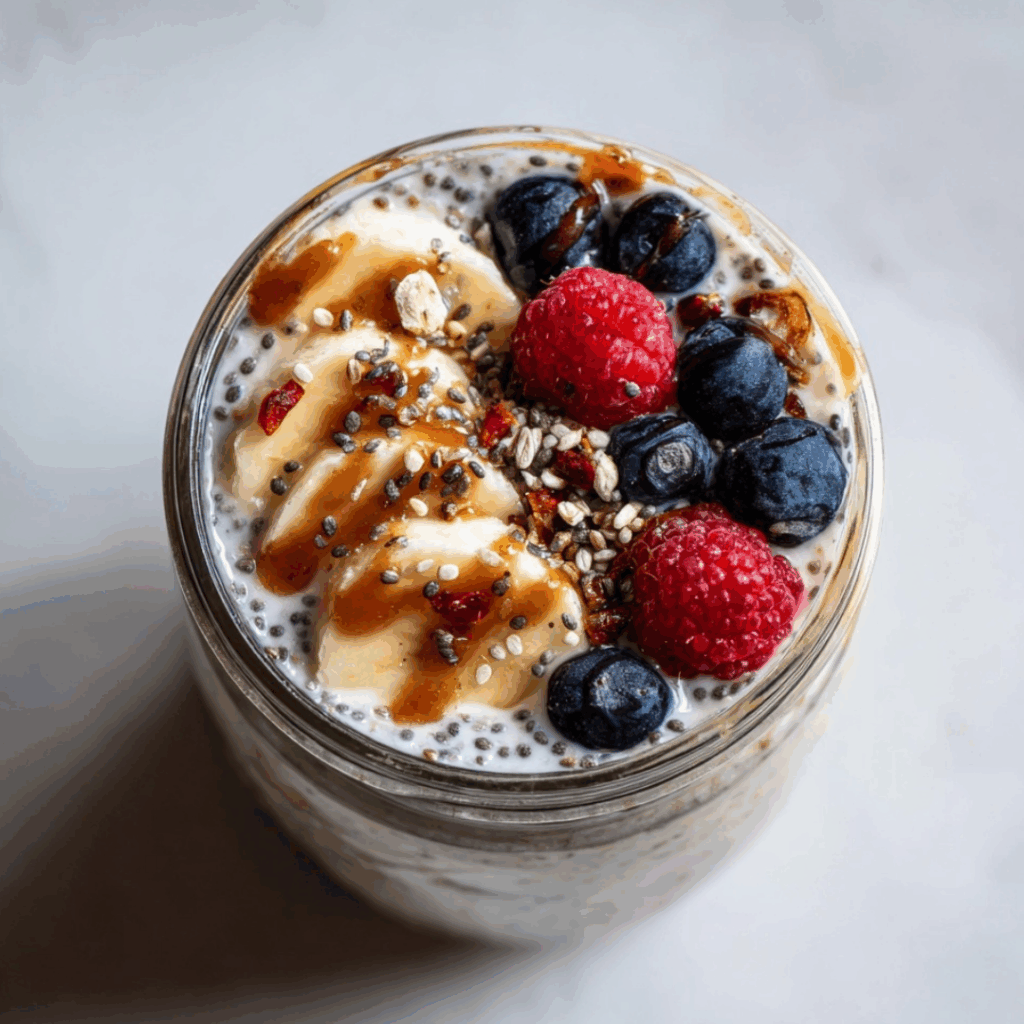
Overnight Oats Nutrition Facts That Work for You
There’s no denying it—overnight oats nutrition facts reveal just how perfectly this breakfast fits into a healthy lifestyle. Whether you’re aiming to boost protein, cut calories, or improve digestion, overnight oats check all the boxes. From fiber and heart-healthy carbs to muscle-building protein and essential micronutrients, they’re a powerhouse in a jar.
The best part? You’re in control. Just like we tailor recipes here in Paula’s Kitchen—from comforting casseroles to indulgent desserts—you can shape overnight oats to meet your needs and your taste. They’re quick, customizable, and nourishing… and that’s exactly the kind of meal that deserves a permanent spot in your morning routine.
FAQs About Overnight Oats Nutrition Facts
Is oats overnight actually healthy?
Yes, overnight oats are considered very healthy. They offer fiber, protein, complex carbs, and essential vitamins and minerals. The key is choosing the right ingredients—unsweetened milk, fruits, seeds, and avoiding added sugars.
What is the nutritional value of overnight oats?
It varies, but a basic serving with oats, milk, and chia seeds contains about 250–350 calories, 5–10g protein, 6–8g fiber, and a wide range of nutrients including magnesium, iron, and B vitamins.
Is overnight oats protein or carbs?
They’re a mix, but primarily complex carbs. However, with protein boosters like Greek yogurt or protein powder, overnight oats can become a solid protein-rich meal.
Is it okay to eat overnight oats every day?
Yes, as long as you vary the ingredients and maintain balanced portions. They’re versatile enough to support daily consumption without nutritional burnout.
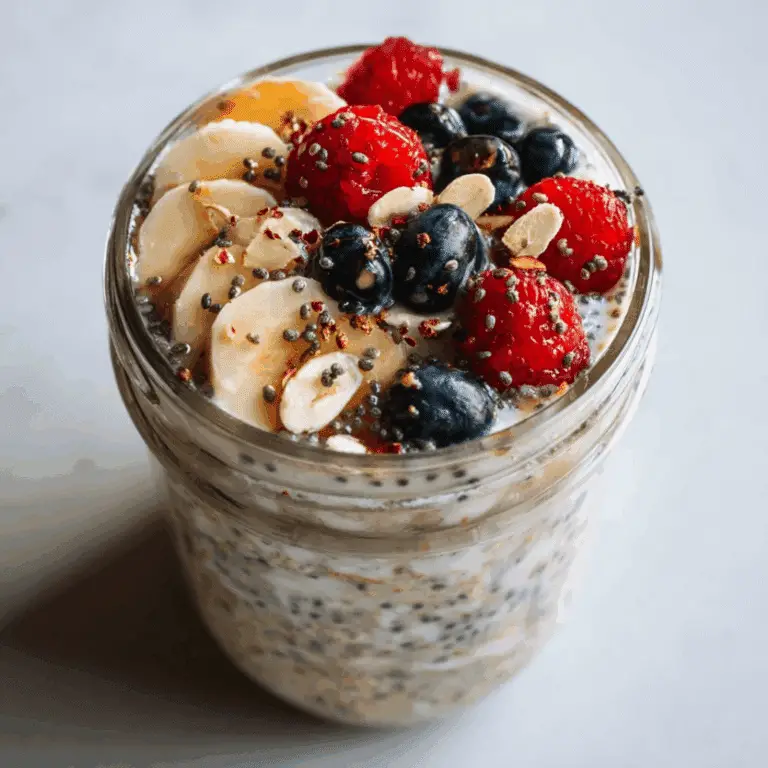
Overnight Oats Nutrition Facts: A Deliciously Smart Start to Your Day
A quick, customizable breakfast packed with protein, fiber, and essential nutrients. Overnight oats are perfect for meal-prep lovers seeking health and convenience.
- Total Time: 5 minutes + overnight chill
- Yield: 1 serving 1x
Ingredients
- 1/2 cup rolled oats
- 1/2 cup almond milk (or milk of choice)
- 1/4 cup Greek yogurt
- 1 tbsp chia seeds
- 1/2 banana, sliced
- 1/4 cup berries
- 1 tsp maple syrup (optional)
Instructions
- Combine oats, milk, chia seeds, and yogurt in a jar.
- Stir in banana slices and berries.
- Add maple syrup if using, then mix well.
- Seal the jar and refrigerate overnight.
- Enjoy cold in the morning or top with more fruit.
Notes
- Use unsweetened almond milk for lower calories.
- Swap Greek yogurt for protein powder for a dairy-free version.
- Top with nuts or seeds for healthy fats.
- Prep Time: 5 minutes
- Cook Time: 0 minutes
- Category: Breakfast
- Method: No Cook
- Cuisine: American
- Diet: Vegetarian
